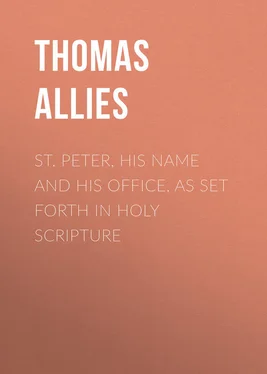Thomas Allies - St. Peter, His Name and His Office, as Set Forth in Holy Scripture
Здесь есть возможность читать онлайн «Thomas Allies - St. Peter, His Name and His Office, as Set Forth in Holy Scripture» — ознакомительный отрывок электронной книги совершенно бесплатно, а после прочтения отрывка купить полную версию. В некоторых случаях можно слушать аудио, скачать через торрент в формате fb2 и присутствует краткое содержание. Жанр: foreign_antique, foreign_prose, на английском языке. Описание произведения, (предисловие) а так же отзывы посетителей доступны на портале библиотеки ЛибКат.
- Название:St. Peter, His Name and His Office, as Set Forth in Holy Scripture
- Автор:
- Жанр:
- Год:неизвестен
- ISBN:нет данных
- Рейтинг книги:3 / 5. Голосов: 1
-
Избранное:Добавить в избранное
- Отзывы:
-
Ваша оценка:
- 60
- 1
- 2
- 3
- 4
- 5
St. Peter, His Name and His Office, as Set Forth in Holy Scripture: краткое содержание, описание и аннотация
Предлагаем к чтению аннотацию, описание, краткое содержание или предисловие (зависит от того, что написал сам автор книги «St. Peter, His Name and His Office, as Set Forth in Holy Scripture»). Если вы не нашли необходимую информацию о книге — напишите в комментариях, мы постараемся отыскать её.
St. Peter, His Name and His Office, as Set Forth in Holy Scripture — читать онлайн ознакомительный отрывок
Ниже представлен текст книги, разбитый по страницам. Система сохранения места последней прочитанной страницы, позволяет с удобством читать онлайн бесплатно книгу «St. Peter, His Name and His Office, as Set Forth in Holy Scripture», без необходимости каждый раз заново искать на чём Вы остановились. Поставьте закладку, и сможете в любой момент перейти на страницу, на которой закончили чтение.
Интервал:
Закладка:
Elsewhere He termed this society His Church, declared that He would 3 3 Matt. xvi. 18.
"build it on a rock, and that the gates of hell should not prevail against it."
He told those whom He had set over it to go forth in His name, and to teach all nations whatsoever He had commanded them, adding the solemn engagement on His own part, 4 4 Matt. xxviii. 19, 20.
"Behold, I am with you all days, even to the consummation of the world."
His whole teaching is full of reference to it, setting forth its nature with every variety of illustration, enfolding it, as it were, with an exuberance of divine charity.
But two conceptions run through every illustration, and are involved in its primary idea, nay, as this was the finished work of His Incarnation, so are they found in His adorable Person, from which His work springs. These conceptions are Unity and Visibility.
As the mystery of the Incarnation consists in the union of the divine and human natures, in one Person, and in the assumption of a body, that is, matter, by the one uncreated, incomprehensible, and invisible Being, whereby He becomes visible, so Unity and Visibility are the unfailing marks of His Church, and enter into every image of it, in such a manner that without them the image loses its point and significancy.
Accordingly He proclaims the Church which He was founding to be "the Kingdom of God," and "the Kingdom of Heaven," thus bringing before us the conceptions of order, government, power, headship on the one hand, dependence on the other, and a host of mutual relations between the Sovereign and the people, significantly remarking that "a kingdom which is divided against itself must fall." Now, a kingdom without unity is a contradiction in terms, and a kingdom of God on earth, which cannot be seen, would be for spirits and not for men.
So He calls it a 5 5 Matt. v. 14; Psalm xlvii. 2; cxxxi. 13, 14.
"city seated on a mountain," which "cannot be hid," answering to His prophet's words, "the city of the great King," "His rest, and His habitation for ever." Here again are embodied the notions of order, government, conspicuous majesty, impregnable strength.
Thus He inspires His apostle to call it 6 6 1 Tim. iii. 15.
"the house of God, the pillar and ground of the truth." The house must have its head, the family their father; the knowledge of that father's will is the truth which rests upon the family as its support and pillar. Outside of the family that knowledge may be lost, together with the will to obey the father and to love him; but within it is a living tradition, "familiar to the ear as household words." As long as the Master and the Father is there, a perpetual light from His face is there too upon His children and His servants. Divide the house, or corrupt its internal life, and the idea of the house is destroyed; while an invisible house is an absurdity.
Again, the Lord, calling Himself 7 7 John x. 11-16.
"the Good Shepherd, who giveth His life for the sheep," terms His Church the sheepfold, and declares that as there is one shepherd, so there must be one fold.
But, rising yet in nearness to the Divine Person of the Word Incarnate, from whose side sleeping on the cross she is moulded, the Church is called His Spouse, as united to Him in eternal wedlock, 8 8 Eph. v. 32, 30.
"a great Sacrament," or mystery; and even yet more, His Body, as supported by the continual influx of her Head; and all her members are called "flesh of His flesh, and bone of His bones."
It is evident, then, that in these promises and illustrations are set forth, as belonging to their object, a visible unity, a perpetual possession and maintenance of the truth, and the closest union with God, founded upon a most supernatural indwelling of the Godhead in a society of men on earth, the founding of which was the "finished work" of God the Word Incarnate. Were these promises to fail in any respect , which is utterly impossible, for while heaven and earth shall pass away, no word of their Maker can pass away — it is plain that our ground for trusting in any promises of Holy Writ whatsoever would be demolished . The whole Christian revelation rests on the imperishable life of the Church; because the corruption or division of the Church would falsify the written records of our faith, in which, after the doctrine of the Blessed Trinity, and the Godhead of our Lord, no truth is so deeply embedded as the perpetual existence and office of the Church.
We have seen the idea of King, Lord, Master, Father, Shepherd, Husband, and Head, running through the delineation of the Church. And no society is complete without its ruler. Such was our Lord, while on earth – the visible ruler of a visible Church. "While I was with them I kept them in Thy name." He went forth from His baptism to win souls. The water became wine in His presence. He bade men follow Him, and they followed. Power went forth from Him, and healed diseases. Grace flowed from His lips and conquered hearts. An innumerable multitude surrounded Him, of all ages and conditions. 9 9 Mark iii. 13.
"And going up into a mountain He called unto Him whom He would Himself; and they came to Him. And He made that twelve should be with Him, and that He might send them to preach."
Here, then, the true Israel chooses the future princes of His house, who should sit with Him on thrones, judging the twelve tribes. Already, while yet with His Church, He is preparing for her future government, when His visible presence shall be taken from her. In three years all should be accomplished, but when 10 10 Dan. ix. 26.
"the covenant should have been confirmed with many in one week, and in the half of the week the victim and the sacrifice should fail;" when His Apostles should see Him no longer; was any one ordained to take that all-important place of supreme ruler which He had filled? For upon earth He had been in two relations to His Church, her Founder, and her Ruler. The former office belonged to His single Person; in its nature it could not pass to another; the work was finished once and for ever. But the latter office was, in its nature likewise, perpetual. How, then, should the charge of visible ruler, as man among men, be executed, when His Person was withdrawn, when He ascended up on high, when all power in heaven and earth was indeed given into His hands, and so the headship of spiritual influence and providential care; but when, nevertheless, that sacred Body was withdrawn into the tabernacle of God, and the Bridegroom was taken away for a time, and the voice and visible presence 11 11 1 John i. 1.
"what they had seen, and heard, and handled, of the word of life," "was with them and kept them" no longer. Should His Church, which had been under one visible ruler from the beginning, now have her government changed? Or had He marked out any one among the Twelve to succeed to His own office of visible headship, and to be 12 12 Luke xxii. 26.
"the greater," and "the ruler" among His brethren. His own special representative and vicar?
To answer this question, we must carefully observe and distinguish what is said and what is given to the Apostles in common , and what to any one of their number in particular ; the former will instruct us as to their equality, the latter as to the pre-eminence which any one enjoyed over the rest, and in what it consisted.
Just, then, as at a certain period of His ministry, our Lord, out of the multitude who followed Him, selected twelve, to be His special attendants upon earth, and, when He should be taken up, to be the heralds of His Gospel among all nations, so out of the twelve He from the beginning distinguished one, marked him out for a peculiar and singular office, connected him with Himself in a special manner, and after having through the whole of His ministry given him tokens and intimations of his future destination, at last expressly nominated him to take His own place, and preside among his brethren. His dealing with this Apostle forms one connected whole, in which there is nothing abrupt or inharmonious, out of keeping, or opposed to what He said to others. What is at first obscurely intimated is afterwards expressly promised, again in fresh terms corroborated, and at last, in yet other language, but of the like force, most significantly 13 13 Vid. John i. 42; Mark iii. 16; Matt. xvi. 18; Luke xxii. 32; John xxi. 15.
conveyed, while it is attested by a number of incidental notices scattered through the whole Gospel history. Thus 14 14 Passaglia, p. 35-7.
it becomes necessary to consider each particular, as well as the whole sum of things said, proper and peculiar to this Apostle; to weigh first their separate and then their joint force, and only at last to form an united judgment upon all.
Интервал:
Закладка:
Похожие книги на «St. Peter, His Name and His Office, as Set Forth in Holy Scripture»
Представляем Вашему вниманию похожие книги на «St. Peter, His Name and His Office, as Set Forth in Holy Scripture» списком для выбора. Мы отобрали схожую по названию и смыслу литературу в надежде предоставить читателям больше вариантов отыскать новые, интересные, ещё непрочитанные произведения.
Обсуждение, отзывы о книге «St. Peter, His Name and His Office, as Set Forth in Holy Scripture» и просто собственные мнения читателей. Оставьте ваши комментарии, напишите, что Вы думаете о произведении, его смысле или главных героях. Укажите что конкретно понравилось, а что нет, и почему Вы так считаете.












